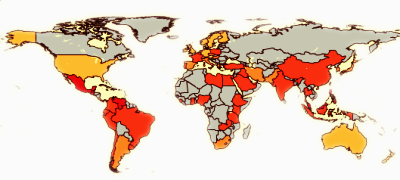⚠️ This website has moved to chato.cl/life
Comparing countries
¿How can we compare the cultures of two countries? Geert Hofstede analized a database of IBM employees (IBM is present in over 70 countries) searching for differences among different countries.For each country, 5 features were extracted:
The site ClearlyCultural.com has a series of world maps showing these scores. For instance this is the map showing the power distance index (redder = more unevenly distributed):

- Power distance index: the larger this number is, the larger the difference among classes. For instance Germany has a score of 35, while Chile has a score of 63 and Guatemala 95.
- Individualism: this measures the importance of an individual with respect to society. In a country like the US, for instance, the score is 91, while Germany has a score of 67 and China a score of 20.
- Masculinity: indicates the extent to which the values that are more stereotypical of men (material success, self-centering, power, strength, etc.) are more important than values associated to women (importance of relationships, quality of live, etc.). Japan has a score of 95, being the society more prototypically "masculine", while Sweden has a score of 5, being the society more prototypically "feminine" in the ranking.
- Aversion to uncertainty: this indicates how much a society avoids unstructured or uncertain situation. Greece in this regard has an index of 112, while in Singapur uncertainty is much less tolerated, with a score of 8.
- Orientation to long term: measures how important are persistence and tradition with respect to shorter-term values. In this regard China has an index of 118 and this is much larger in general in Asian countries. Norway has a score of 20. Unfortunately this index is available only for a few countries.
The site ClearlyCultural.com has a series of world maps showing these scores. For instance this is the map showing the power distance index (redder = more unevenly distributed):



